- Home
- Sue Grafton
O is for OUTLAW Page 5
O is for OUTLAW Read online
Page 5
Mickey was revered by his fellow officers and, until that March, his departmental run-ins were focused on a series of minor infractions. He was late with his reports and occasionally insubordinate, though he seemed to have an instinct for how far he could push. He’d been the subject of two citizens’ complaints: once for offensive language and once for excessive use of force. In both incidents the department investigated and found in his favor. Still, it didn’t look good. His was an odd mix of the offbeat and the conventional. In his personal life, he was scrupulously honest about his taxes, his bills, his personal debts. He was loyal to his friends and discreet with regard to others. He also honored his commitments, except (apparently) to me. He would never violate a confidence, never rat out a pal or a fellow officer. Among men, he was esteemed. With women, he was regarded with an admiration bordering on hero worship. I know because I did this myself, elevating his nonconformity to something praiseworthy instead of faintly dangerous.
Looking back on it, I can see that I didn’t want to know the truth about him. I had graduated from the police academy in April of 1971 and was hired by the Santa Teresa Police Department as soon as I turned twenty-one in May. I’d met Mickey the previous November, and I was dazzled by the image he projected: seasoned, gruff, cynical, wise. Within months we fell in love, and by August we were married, all of this before either of us understood what the other was about. Once committed, I was determined to see him as the man I wanted him to be. I needed to believe. I saw him as an idol, so I accepted his version of events even when common sense suggested he was slanting the facts.
In the fall of 1971, after Mickey was reassigned to burglary and theft, he developed what was euphemistically referred to as a “personality conflict” with Con Dolan, who headed crimes against property. Lieutenant Dolan was an autocrat and a stickler for regulations, which caused the two of them to clash time and time again. Their differences put an end to Mickey’s hopes for advancement.
Six months later, in the spring of 1977, Mickey resigned from the department to avoid yet another tangle with Internal Affairs. He was, at that time, under investigation for voluntary manslaughter after he’d been involved in a bar dispute. His altercation with a transient named Benny Quintero resulted in the man’s death. This was March 17, St. Patrick’s Day, and Mickey was off duty, drinking at the Honky-Tonk with a bunch of buddies, who supported his account. He claimed the man was drunk and abusive and exhibited threatening behavior. Mickey removed him bodily to the parking lot, where the two engaged in a brief shoving match. To hear Mickey tell it, he’d pushed the guy around some, but only in response to the drunk’s attack. Witnesses swore he hadn’t landed any blows. Benny Quintero left the scene, and that was the last anyone reported seeing him until his body was discovered the next day, beaten and bloody, dumped by the side of Highway 154. Internal Affairs launched an investigation, and Mickey’s attorney, Mark Bethel, advised him to keep his mouth shut. Since Mickey was the prime suspect, facing the possibility of criminal charges, Bethel was doing what he could to cover his backside. IA can coerce testimony but is forbidden to share findings with the DA’s office. There could be serious consequences all the same. Given the overarching need for honest officers, the department was determined to pursue the matter. Mickey resigned in order to avoid questioning. If he hadn’t left when he did, he’d have been fired anyway for his refusal to respond.
The day Mickey turned in his badge, his weapon, and his radio, his fellow officers were incensed. Department regulations prohibited his superiors from making any public statement, and Mickey downplayed his departure, which made him look all the more heroic in the eyes of his comrades. The impression he gave was that, despite their treatment of him, his loyalty to the department overrode his right to defend himself against accusations completely contrived and unfair. So convincing was he that I believed him myself right up to the moment when he asked me to lie for him. A criminal investigation was initiated, which is where I came in. Apparently, there were four hours unaccounted for in Mickey’s alibi for that night. He refused to say where he’d been or what he’d done between the time he left the Honky-Tonk and the time he arrived home. He was suspected of following the guy and finishing the job elsewhere, but Mickey denied the whole thing. He asked me to cover for him, and that’s when I walked.
I left him April 1 and filed for divorce on the tenth of that month. Some weeks later, the findings from the coroner’s exam revealed that Quintero, a Vietnam veteran, had suffered a service-related head injury. In combat, he’d been hit by sniper fire, and a stainless-steel plate now served where a portion of his skull had been blown away. The official cause of death was a slow hemorrhage in the depths of his brain. Any minor blow could have generated the fatal seepage. In addition, the toxicology report showed a blood alcohol level of .15 with traces of amphetamine, marijuana, and cocaine. There was no actual evidence that Mickey had encountered Benny after their initial scuffle in the parking lot. The DA declined to file charges, so Mickey was off the hook. By then, of course, the damage had been done. He’d been separated from the city and he was, soon afterward, permanently separated from me. In the intervening years, my disenchantment had begun to fade. While I didn’t want to see him, I didn’t wish him ill. The last I’d heard he was doing personal security, a once-dedicated cop demoted to working night shift in an imitation cop’s uniform.
I read the letter again, wondering what I would have done if I’d received it back then. I felt a ripple of anxiety coursing through my frame. If this was true, I had indeed contributed to his ruin.
I opened the drawer and took out my address book, which opened as if by magic to the page where he was listed. I picked up the handset and punched in the number. The line rang twice, and then I was greeted with a big two-tone whistling and the usual canned message telling me the number in the 13 area code was no longer in service. If I felt I’d reached the recording in error, I could recheck the number and then dial it again. just to be certain, I redialed the number and heard the same message. I hung up, trying to decide if there were any other possibilities I should pursue.
Chapter 5
*
I hadn’t visited the house on Chapel Street for a good fifteen years. I parked out in front and let myself into the yard through a small wroughtiron gate. The house was white frame, a homely story-and-a-half, with an angular bay window and a narrow side porch. Two second-story windows seemed to perch on the bay, and a simple wood filigree embellished the peaked roof. Built in 1875, the house was plain, lacking sufficient charm and period detail to warrant protection by the local historical preservationists. Out front, a stream of one-way traffic was a constant reminder of downtown Santa Teresa, only two blocks away. In another few years, the property would probably be sold and the house would finish its days as a secondhand furniture store or a little mom-and-pop business. Eventually, the building would be razed and the lot would be offered up as prime commercial real estate. I suppose not every vintage single-family dwelling can be spared the wrecker’s ball, but a day will soon come when the history of the common folk will be entirely erased. The mansions of the wealthy will remain where they stand, the more ponderous among them converted for use by museums, art academies, and charitable foundations. A middle-class home like this would scarcely survive to the turn of another century. For the moment, it was safe. The front yard was well tended and the exterior paint looked fresh. I knew from past occasions the backyard was spacious, complete with a hand-laid brick patio, a built-in barbecue pit, and an orchard of fruit trees.
I pressed the front doorbell. A shrill note echoed harshly through the house. Peter Shackelford, “Shack,” and his wife, Bundy, had been close friends of Mickey’s long before we met. Theirs was a second marriage for both, Shack was divorced, Bundy widowed. Shack had adopted Bundy’s four kids and raised them as his own. In those days, the couple entertained often and easily: pizza, potluck suppers, and backyard barbecues, paper plates, plastic ware, and bring-your-own-bottle, wit
h everyone pitching in on cleanup. There were usually babies in diapers, toddlers taking off on cross-lawn forays. The older kids played Frisbee or raced around the yard like a bunch of hooligans. With all the parents on the scene, discipline was casual and democratic. Anyone close to the miscreant was authorized to act. In those days, I wasn’t quite so self-congratulatory about my childless state, and I would occasionally keep an eye on the little ones while their parents cut loose.
Mickey and Shack had joined the Santa Teresa Police Department at just about the same time and had worked in close proximity. They were never partners, per se, but the two of them, along with a third cop named Roy “Lit” Littenberg, were known as the Three Musketeers. Lit and Shack were part of the crowd at the Honky-Tonk the year Mickey went down. I was hoping one or the other would know his whereabouts and his current status. I also needed confirmation of the letter’s contents. I’d been convinced Mickey was guilty of the beating that resulted in Benny’s death. I wasn’t sure what I’d do if it turned out he’d had a legitimate alibi for that night. The idea made my stomach roll with anxiety.
Shack answered the door half a minute later, though it took him another ten seconds to figure out who I was. The delay gave me a chance to register the changes in him. In the period when I’d known him, he must have been in his late thirties. He was now in his early fifties and a good twenty-five pounds heavier. Gravity had tugged at all the planes in his face, now defined by a series of downward-turning lines: dense brows over drooping eyelids, sagging cheeks, a bushy mustache and heavy mouth curving down toward his double chin. His thick salt-and-pepper hair was clipped close to his head as though he were still subject to departmental regulations. He was wearing shorts, flip-flops, and a loose white T-shirt, the sagging neckline revealing a froth of white chest hair. Like Mickey, Shack had lifted weights three days a week, and there was still the suggestion of power in the way he carried himself.
“Hello, Shack. How are you?” I said, when I could see that my identity had been noted. I didn’t bother to smile. This was not a social visit, and I guessed his feelings for me were neither friendly nor warm.
His tone when he spoke was surprisingly mild. “I always figured you’d show up.”
“Here I am,” I said. “Mind if I come in?”
“Why not?”
He stepped aside, allowing me to enter the front hall ahead of him. Given the echoes of the past, the quiet seemed unnatural. “Might as well follow me out back. I don’t spend a lot of time in this part of the house.” Shack closed the door and moved down the hall toward the kitchen.
Even the most cursory glance showed half the furniture was gone. In the living room, I spotted a coffee table, miscellaneous side tables, and a straightback wooden chair. The silver-dollar-sized circles of matted carpeting indicated where the couch and easy chairs had once been. The built-in bookcases, flanking the fireplace, were now bereft of books. In their place, twenty-five to thirty framed photographs showed a myriad of smiling faces: babies, children, and adults. Most were studio portraits, but there were several enlargements of snapshots from family gatherings.
“Are you moving?”
He shook his head. “Bundy died six months ago,” he said. “Most of the furniture was hers anyway. I let the kids take what they wanted. There’s plenty left for my purposes.”
“Is that them in the photographs?”
“Them and their kids. We got thirteen grandchildren among the four of them.”
“Congratulations.”
“Thanks. The youngest, Jessie, you remember her?”
“Dark curly hair?”
“That’s her. The wild one in the bunch. She hasn’t married to date, but she adopted two Vietnamese children. “
“What’s she do for a living?”
“Attorney in New York. She does corporate law.”
“Do any of the others live close?”
“Scott’s down in Sherman Oaks. They’re spread out all over, but they visit when they can. Every six, eight months, I fire up the Harley and do a big round trip. Good kids, all of them. Bun did a hell of a job. I’m a sorry substitute, but I do what I can.”
“What are you up to these days? I heard you left the department.”
“A year ago this May. I don’t do much of anything, to tell you the truth.”
“You still lifting weights?”
“Can’t. I got hurt. Had an accident on duty. Some drunk ran a red light and broadsided my patrol car. Killed him outright and knocked me all to hell and gone. I got a fractured fifth vertebra so I ended up taking an industrial retirement. A worker’s comp claim.”
Too bad.”
‘No point complaining about things you can’t change. The money pays the bills and gives me time to myself. What about you? I hear you’re a P.I.
“I’ve been doing that for years.”
He led me through the kitchen to the glassed-in porch that ran along the rear of the house. He seemed to live the way I did, confined to one area like a pet left alone while its owners are off at work. The kitchen was completely tidy. I could see a single plate, a cereal bowl, a spoon, and a coffee mug in the dish rack. He probably used the same few utensils, carefully washing up between meals. Why put anything away when you’re only going to take it out and use it again? There was something homely about the presence of the dishes in the rack. From the look of it, he lived almost exclusively in the kitchen and enclosed porch. A futon, doubling as a couch, was set up at one end, blankets neatly folded with the pillows stacked on top. There was a TV on the floor. The rest of the porch was taken up with woodworking equipment: a lathe, a drill press, a router, a couple of C clamps, a vise, a wood chisel, a table saw, and an assortment of planes. He was in the process of refinishing two pieces. A chest of drawers had been stripped, pending further attention. A wooden kitchen chair had been laid on its back, its legs sticking out as stiffly as a dead possum’s. Shack must sleep every night with the heady scent of turpentine, glue, tung oil, and wood shavings. He caught my look and said, “Virtue of being single. You can do anything you want.”
I said, “Amen to that.”
Once upon a time, Bundy had sewn the cafe curtains, hanging them on rods across the middle of the row of windows. The green and white checked cotton, probably permanent press, still looked fresh: crisp, carefully laundered, with little clip-on curtain rings. I found my eyes filling inexplicably with tears and had to feign attention to the backyard, which I could see through the glass. Many of the trees remained, as bent as old spines, curving toward the ground from a onceproud height. A saddle of purple morning glories was cinched to the fence, the chicken wire now swaybacked from the weight of the vines. The barbecue grill top had turned red-brown with rust, replaced by a portable kettle grill parked closer to the back steps.
Shack leaned against the wall with his arms folded across his chest. “So what’s the reason for the call?”
“I’m looking for Mickey. The only number I have is a disconnect. “
“You have business with him?”
“I may. I’m not sure. Do I need your approval before I telephone the man?”
Shack seemed amused. Bundy had always given him a hard time. Maybe he missed the rough and tumble of conversation. Live alone long enough and you forget what it’s like. His smile faded slightly. “No offense, kiddo, but why not leave him alone?”
“I want to know he’s okay. I don’t intend to bother him. When’s the last time you spoke?
“I don’t remember.”
“I see. Do you have any idea what’s going on with him?”
“I’m sure he’s fine. Mickey’s a big boy. He doesn’t need anyone hovering.”
“Fair enough,” I said, “but I’d like the reassurance. That’s all this is. Do you have his current phone or address?”
Shack shook his head and his mouth pulled down. “Nope. He initiates contact when it suits. In between calls, I make a point of leaving him alone. That’s the deal we made.”
“What about Lit?”
“Roy Littenberg died. The Big C took him out in less than six weeks. This was three years ago.”
“I’m sorry to hear that. I liked him.”
“Me too. I see his boy now and then: Tim. You’ll never guess what he does.”
“I give up.”
“He bought the Honky-Tonk. Him and Bundy’s boy, Scottie, pal around together whenever Scottie’s in town.”
I said, “Really. I don’t remember meeting either one. I think both were off in Vietnam when Mickey and I were hanging out here.” In Santa Teresa, all paths were destined to cross and recross eventually. Now the next generation was being folded into the mix. “Can you think of anyone else who might know what Mickey’s up to?”
Shack studied me. “What’s my motive in this”
“You could be helping him.”
“And what’s yours?”
“I want the answer to some questions I should have asked back then.”
“About Benny?”
“That’s right.”
His smile was shrewd. He cupped a hand to his ear. “Do I hear guilt?”
“If you like.”
“A little late, don’t you think?”
“Probably. I’m not sure. The point is, I don’t need your permission. Now, will you help me or not?”

 S Is for Silence
S Is for Silence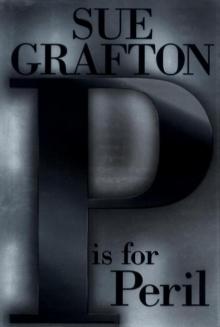 P Is for Peril
P Is for Peril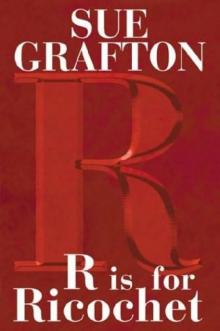 R Is for Ricochet
R Is for Ricochet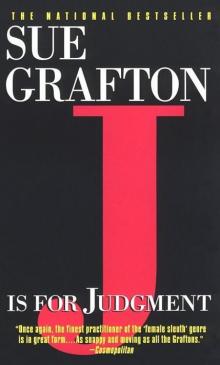 J Is for Judgment
J Is for Judgment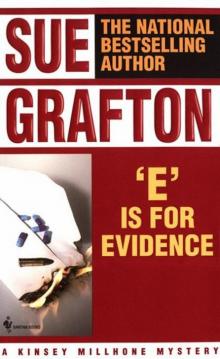 E Is for Evidence
E Is for Evidence T Is for Trespass
T Is for Trespass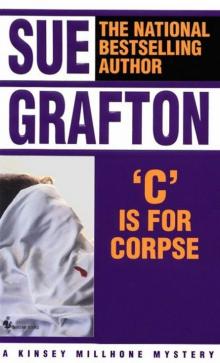 C Is for Corpse
C Is for Corpse U Is for Undertow
U Is for Undertow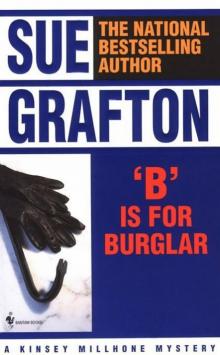 B Is for Burglar
B Is for Burglar Four Sue Grafton Novels
Four Sue Grafton Novels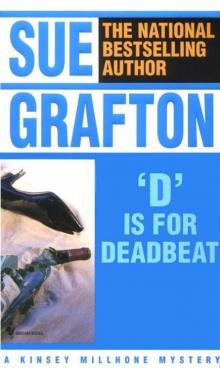 D Is for Deadbeat
D Is for Deadbeat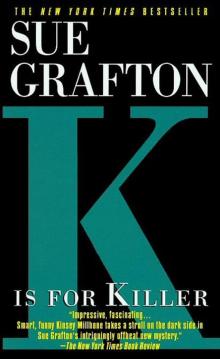 K Is for Killer
K Is for Killer I Is for Innocent
I Is for Innocent A Is for Alibi
A Is for Alibi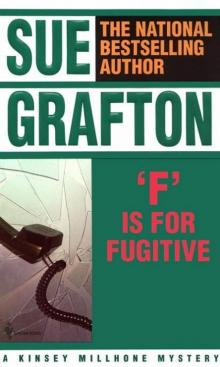 F Is for Fugitive
F Is for Fugitive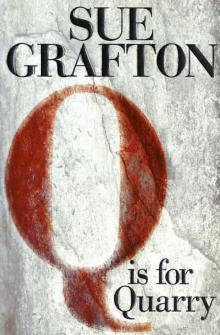 Q Is for Quarry
Q Is for Quarry W Is for Wasted
W Is for Wasted Kinsey and Me: Stories
Kinsey and Me: Stories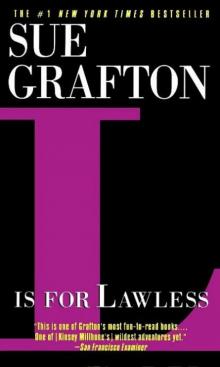 L Is for Lawless
L Is for Lawless Y Is for Yesterday
Y Is for Yesterday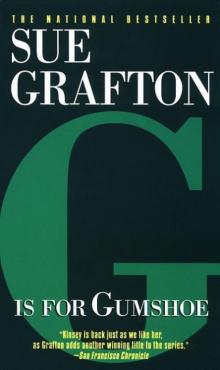 G Is for Gumshoe
G Is for Gumshoe O Is for Outlaw
O Is for Outlaw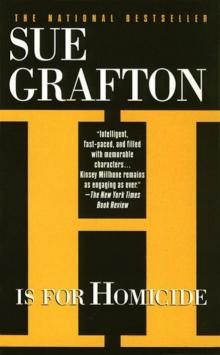 H Is for Homicide
H Is for Homicide X
X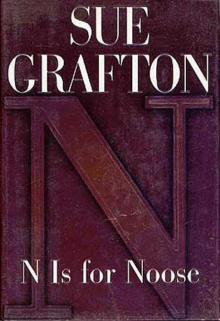 N Is for Noose
N Is for Noose Three Complete Novels: A Is for Alibi / B Is for Burglar / C Is for Corpse
Three Complete Novels: A Is for Alibi / B Is for Burglar / C Is for Corpse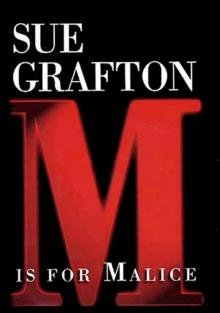 M Is for Malice
M Is for Malice I is for INNOCENT
I is for INNOCENT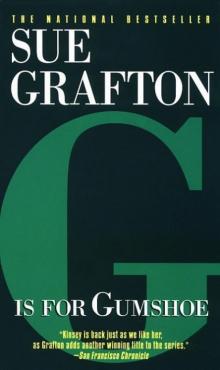 G is for GUMSHOE
G is for GUMSHOE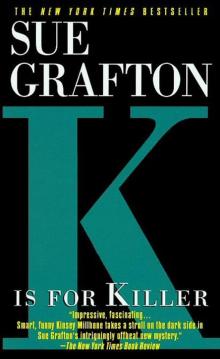 K is for KILLER
K is for KILLER S is for SILENCE
S is for SILENCE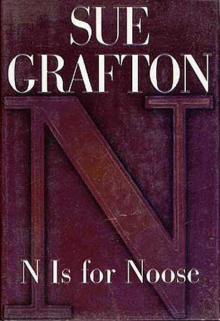 N is for NOOSE
N is for NOOSE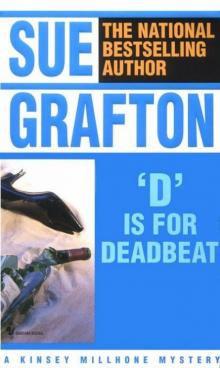 D is for DEADBEAT
D is for DEADBEAT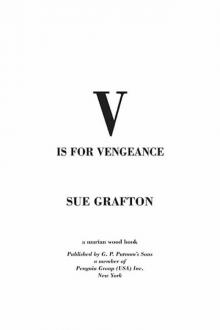 V is for Vengeance
V is for Vengeance U is for Undertow
U is for Undertow W Is for Wasted km-23
W Is for Wasted km-23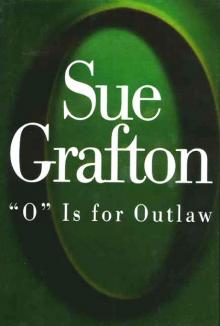 O is for OUTLAW
O is for OUTLAW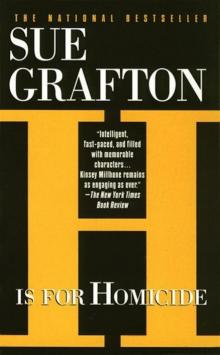 H is for HOMICIDE
H is for HOMICIDE Sue Grafton Novel Collection
Sue Grafton Novel Collection Kinsey and Me
Kinsey and Me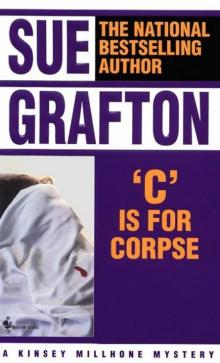 C is for CORPSE
C is for CORPSE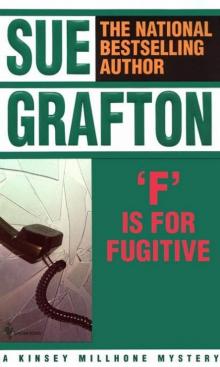 F is for FUGITIVE
F is for FUGITIVE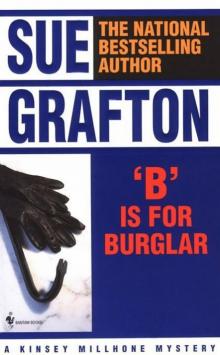 B is for BURGLAR
B is for BURGLAR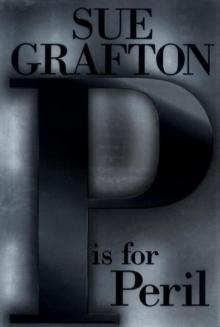 P is for PERIL
P is for PERIL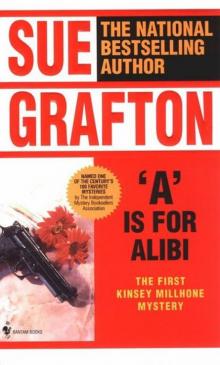 A is for ALIBI
A is for ALIBI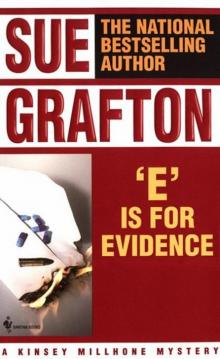 E is for EVIDENCE
E is for EVIDENCE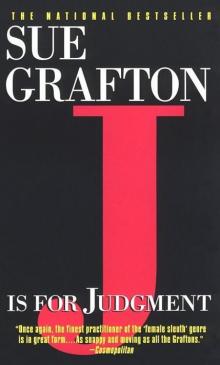 J is for JUDGMENT
J is for JUDGMENT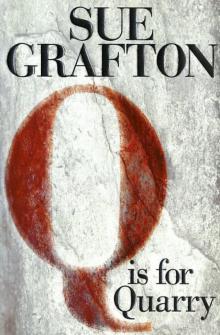 Q is for QUARRY
Q is for QUARRY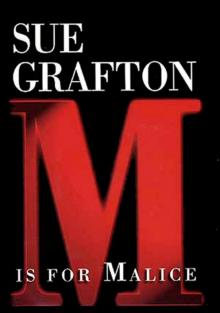 M is for MALICE
M is for MALICE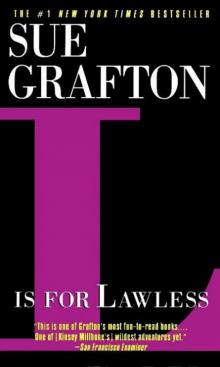 L is for LAWLESS
L is for LAWLESS